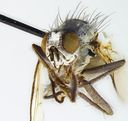Muscidae
Muscidae
Classification
Pronunciation
How to pronounce Muscidae: //ˈmjuːsɪdiː//
These audio files are automatically generated. While they are not always 100% accurate, they are a good starting point.
Images






Summary
Muscidae, also known as house flies and stable flies, are a family of flies with a worldwide distribution, important in both ecological and economic contexts due to their roles as pests and disease vectors.
Physical Characteristics
Antennae are three-segmented and aristate; vein Rs is two-branched; frontal suture present; calypters well developed; arista usually plumose for the entire length; hypopleuron usually without bristles; generally more than one sternopleural bristle; R5 cell either parallel-sided or narrowed distally; vein 2A is short and does not reach wing margin.
Identification Tips
Look for three-segmented, aristate antennae, and two-branched Rs vein.
Habitat
Larvae develop in decaying vegetation, dry and wet soil, nests of insects and birds, fresh water, and carrion.
Distribution
Worldwide, with nearly 700 species in various regions.
Diet
Adults can be predatory, hematophagous, saprophagous, or feed on plant and animal exudates; attracted to substances like sugar, sweat, tears, and blood.
Life Cycle
Larvae mainly develop in decaying plant material or manure.
Ecosystem Role
Some species act as passive vectors of pathogens, contributing to nutrient cycling in their habitats.
Economic Impact
Species can be pests in agriculture, affecting crops like rice and maize.
Health Concerns
Adults can spread pathogens causing diseases such as typhoid fever, dysentery, anthrax, and African sleeping sickness.
Evolution
The family Muscidae may have originated as long ago as the Permian, with fossil records beginning in the Eocene.
Similar Taxa
Tags
- Muscidae
- flies
- pests
- pathogens
- agriculture